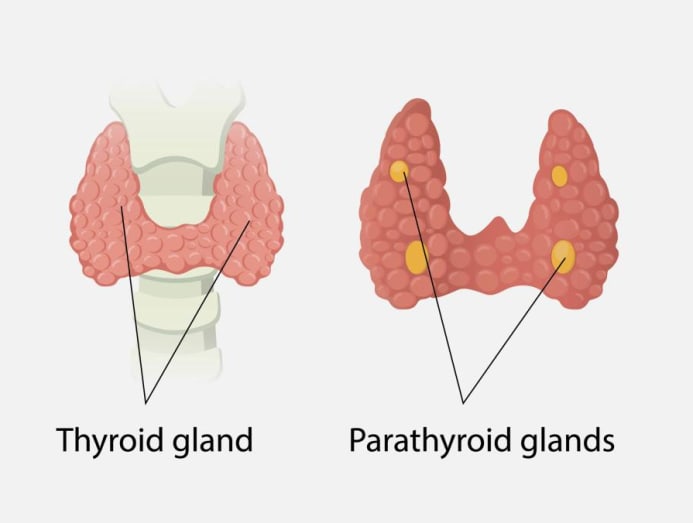This health condition leaches calcium off your bones and it has to do with malfunctioning glands in your neck
Osteoporosis isn't the only disease that weakens bones; there is also hypercalcaemia, which causes your bones to lose calcium. Find out from Ng Teng Fong General Hospital's surgeon, who specialises in breast and endocrine surgery, why it happens and if calcium supplements help.

(Photo: iStock/undefined undefined)
You may have heard of osteoporosis, where your bones become brittle and break easily due to a lack of calcium. But have you heard of hypercalcaemia? It is a condition where your body causes your bones to lose calcium. The result is not only weakened bones but it can also lead to kidney stones – and affect your heart and brain functions.
Primarily, hypercalcaemia occurs when the parathyroid glands in your neck over-produce the parathyroid hormone. This hormone’s function is to regulate your body’s calcium level, said Dr Oh Han Boon, a consultant with Ng Teng Fong General Hospital’s Department of General Surgery, Division of Breast and Endocrine Surgery. But when the parathyroid hormone level gets too high, your body will leach calcium out of your bones and into the bloodstream.
The four parathyroid glands are typically found in the neck, next to the thyroid gland. That’s their “typical” location because these glands can also be found behind the oesophagus, near the main blood vessels of the neck (known as carotid sheath) and even outside of the neck, according to Dr Oh.
“Sometimes, parathyroids can be located in the chest such as in the thymus or mediastinum. The parathyroid glands can also differ in number, sometimes up to eight in some people,” said Dr Oh.

Things go awry when one of these parathyroid glands start to over-produce the parathyroid hormone. “In 95 per cent of patients, one of the glands is hyper-functioning,” said Dr Oh, who added that it is rare for more than one parathyroid gland to do so.
What usually sends the glands into over-drive is the presence of a non-cancerous tumour known as an adenoma. There can be a few reasons for the adenoma’s presence and growth, said Dr Oh. One, a prolonged and severe calcium or Vitamin D deficiency. Two (but rarely), previous exposure to radiation or radioactive iodine therapy. The latter has been reported but they are not well-established causes, he said.
“The majority of adenomas are sporadic, but multiple adenomas may indicate a genetic predisposition, especially in the very young,” he added.
That one malfunctioning gland is enough to cause a whole lot of damage. The unusually high hormone level directs your body to secrete calcium into the blood, raising the blood-calcium level and creating a situation known as hyperparathyroidism. If nothing is done to bring the parathyroid hormone level down, it can lead to hypercalcaemia.
“Until the gland with the disorder is removed, the patient’s condition will continue worsening,” said Dr Oh.

WHAT DAMAGE CAN HYPERCALCAEMIA CAUSE?
The patient is likely to experience excessive thirst and frequent urination as the kidneys have to work hard to filter out high levels of calcium; in more severe cases, kidney stones or blood may be detected in the urine. There can also be pain in the bones and muscle weakness as calcium leaches out from the bones, said Dr Oh.
That’s not all. There may be stomach upsets, nausea and vomiting – signs of acute pancreatitis or peptic ulcer disease. “These are postulated to be due to calcium deposits in the pancreatic duct and increase in gastrin secretion in the stomach causing gastric ulcers,” said Dr Oh. Hypercalcaemia can also cause your gut to slow down, resulting in constipation and even nausea and vomiting.
There’s even a neurological connection. “Psychosis can happen in severe hypercalcaemia resulting from an electrolyte imbalance and can even lead to coma. Other more common neurologic symptoms include depression, lethargy and memory loss,” said Dr Oh.
According to him, there can be other causes of hypercalcaemia, including certain types of cancers (especially those concerning the bone), chronic kidney disease and medications such as diuretics.
THYROID VS PARATHYROID GLANDS – HOW ARE THEY DIFFERENT?
The thyroid and parathyroid glands are both endocrine organs, meaning they produce hormones. And they are both located in the neck. But the similarities stop when it comes to the effects of the hormones they produce.
The main role of the parathyroid hormone is to modulate calcium, phosphate and Vitamin D in bone metabolism, explained Dr Oh Han Boon, a consultant with Ng Teng Fong General Hospital’s Division of Breast and Endocrine Surgery, Department of General Surgery. “The thyroid hormones modulate virtually every other organ system in the body to maintain homeostasis.
“As such, hyperparathyroidism and hyperthyroidism are very different conditions and the treatments are also different.”
As you can probably tell from the abovementioned symptoms, “the long-term effects of hypercalcaemia from primary hyperparathyroidism are wide ranging”, said Dr Oh. “For example, extreme hypercalcaemia can cause arrhythmias (irregular heartbeats) and an increased risk of hypertension and heart disease.”
The situation can also lead to both acute and chronic kidney failure as well as osteoporosis, which has been infamously linked to fractured spines and hips that “can be potentially fatal, especially in the elderly”, said Dr Oh.
WHO IS PRONE TO HYPERCALCAEMIA?
“The number of patients seeing us for hypercalcaemia from primary hyperparathyroidism has definitely increased,” said Dr Oh. “More people are now going for health screenings, which then pick up the high blood-calcium on their blood investigations.”
However, there is still a number of patients who may be missed because calcium screening is not done as part of the routine blood test at polyclinics, said Dr Oh. “Most patients with hyperparathyroidism will have symptoms, but these symptoms are very non-specific, such as memory loss, mood changes, osteoporosis and constipation.
”Women tend to be affected twice as much as men, which is “likely due to the increase in bone resorption after menopause”, said Dr Oh. Age is another factor (mainly between 50 and 65 years old), although younger patients are seen with recurrent urinary stones and unexpected bone fractures.

“The youngest patient I have seen is 25 years old,” said Dr Oh, adding that the diagnosis was due to a genetic condition known as multiple endocrine neoplasia syndrome. “The youngest patient I have operated on is 37 years old, who presented with recurrent urinary stones.”
TREATMENTS AVAILABLE
If the hypercalcaemia is caused by an adenoma, the most straightforward course of action is to remove it. This can be performed using a minimally invasive procedure known as focused parathyroidectomy, which leaves a scar that is no longer than 2cm, said Dr Oh.
Depending on the size of the tumour, it can even be a day surgery (patients with large adenomas may need a day to monitor their blood calcium levels post-surgery).
CAN A HIGH CALCIUM INTAKE CAUSE HYPERCALCAEMIA?
The excessive intake of calcium pills alone is rarely a cause of hypercalcaemia in people with normal-functioning parathyroid glands.
However, in patients with poor kidney function and who cannot excrete calcium through their urine efficiently, excessive calcium intake can cause hypercalcaemia, said Dr Oh Han Boon, a consultant with Ng Teng Fong General Hospital’s Division of Breast and Endocrine Surgery, Department of General Surgery..
Milk-alkali syndrome, where a high intake of calcium leading to an alkalotic state causing kidney failure, can also result in hypercalcaemia. "Thankfully, these are uncommon," said Dr Oh.
The total intake of calcium for a normal adult should not regularly exceed more than 2,000mg per day.
First, an ultrasound scan, parathyroid nuclear scan or 4D CT scan is performed to locate the adenoma, said Dr Oh. “In cases where more than one adenoma is suspected, we explore the neck to look at the other three parathyroid glands to ensure they are not enlarged.”
In cases where more than one adenoma is suspected, a blood test known as intraoperative parathyroid hormone assay is used to ensure that the hormone levels revert to normal before the end of the surgery.
After the adenoma is removed, patients may experience “hungry bone syndrome” or hypocalcaemia, which is the opposite of hypercalcaemia, said Dr Oh. Patients are usually discharged with oral calcium and Vitamin D tablets to feed their bones as they start absorbing calcium back from the blood, he said.
“There is no need for any hormonal replacement therapy after surgery. The parathyroid hormone levels go back to normal immediately after a successful surgery as the other parathyroid glands are functioning normally.” Moreover, “only one normal-functioning parathyroid gland is sufficient to maintain the body's bone functions,” he said.





